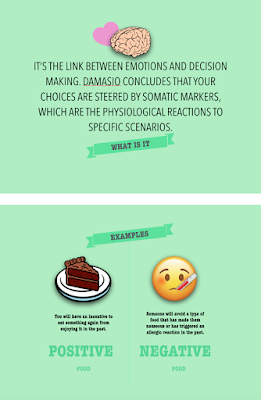Somatic Marker Theory

The Somatic Marker Theory is a physiological hypothesis proposed by Antonion Damasio. He suggests that every experience we face stores what is called a somatic marker, which is kept in our memories. As a result, our body remembers how it reacted to specific scenarios and based upon both the emotions and physiological reactions to the aforesaid, it impacts our decision-making. This hypothesis is particularly true in situations in which our cognition and logic can not make a decision, and therefore, we rely on our emotions to reach make a choice.
Damasio believes that emotions are physiological stimuli that occur when we are exposed to different situations. Those physiological stimuli are processed by the brain, which the brain then turns into an emotion that tells the individual how they should feel in response to those stimuli.
An example (as shown in the picture) can be food. When you eat really good chocolate cake, your physiological response comes from a mix of your taste buds and your nose. Your lungs take in the smell and your smell receptors identify whether the food is sweet, savory or bitter. Your taste buds then confirm that taste. Because the cake is tasty, your mouth produces more amylase which is why you salivate more with food you like. Your brain stores these responses as physiological somatic markers, which means that the next time you need to make a choice between chocolate and vanilla cake, you will likely choose the chocolate one due to the pervious emotional knowledge.

The theory that emotion is linked to memory has been vastly investigated by psychologists. It is a speculation that many have thought of yet can never put a name to. The theory is further looked into by the use of psychoanalysis, where an individual's fears and desires are thought to be linked to a past event of sorts. These individuals believe that a certain emotion and decision is brought about due to their past experiences. However, you can look beyond scholarly articles towards religious connotations, in which some ethnic groups believe in re-incarnation and the idea of one experiencing a certain emotion due to experiences in their previous life. It would be interesting to test this out on patients with Alzheimer's - would they omit the same emotions when tasting one of their favourite cakes every time? How would they react to a past event that had scarred them in their current mental state - would the brain remember the emotion or would it form a new one? And if so, from which memory?
ReplyDeleteThis theory is extremely interesting as our brains do remember certain choices we make, and your example of the cake is true, because when when we can't make a decision on which one is better, vanilla or chocolate, our memory may controls the emotion we fee to make a decision. Thus, we could conclude that somatic markers may increase the efficiency and accuracy of human decision making.
ReplyDeletePersonally, I feel that our mind is designed to not change our minds and opinions about certain things. If you had a bad experience with something, you probably felt negative emotions and then stored them as negative somatic markers. Therefore, next time we have to decide whether to experience that again or not, you will not do it. Concluding, I fully agree with this theory as I believe that decision making really depends on our past experiences and how we felt about it as well as how our body responded to it.
ReplyDeleteThis was a very interesting topic, although our group had the same topic, you were able to explain it from a good point of view with evidence to facts; Moreover, I love the example that you used, it had a very strong relation to the topic.
ReplyDelete